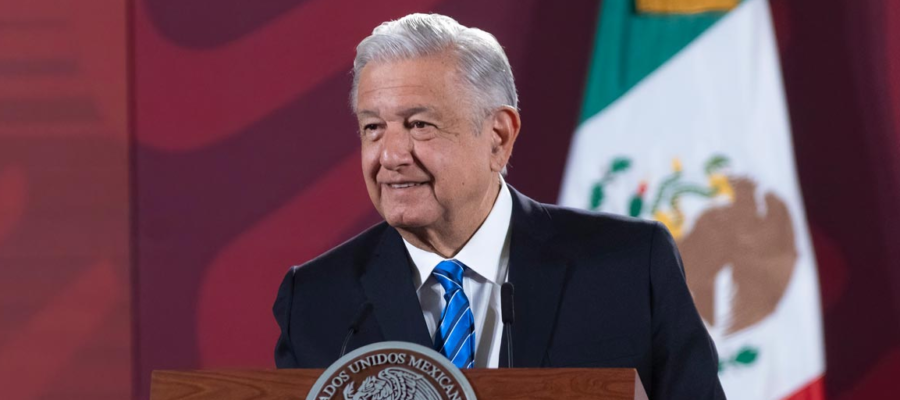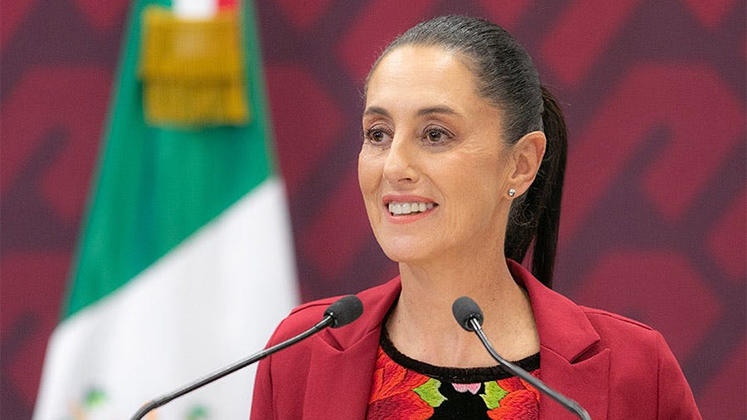By Kent Paterson
If outgoing Mexican President Andrés Manuel López Obrador (AMLO) has accomplished anything during his five year plus term, it could be said that he’s laid down the third rail of Mexican politics.
Focusing on AMLO’s Maya Train, the new tourism megaproject cutting through the country’s southeastern jungles, or the President’s plan to revive the national passenger train service dismantled with the onset of the old North American Free Trade Agreement, foreign media train talk of Mexico has tended to overlook what could well prove to be AMLO’s most enduring legacy: expanded pensions and other social programs benefiting the working class that are emerging as not only a national consensus but as an institutional reality.
In a major speech delivered on February 5, the Mexican Constitution Day holiday, AMLO rolled out a list of 20 constitutional and legal reforms for Congress to consider, including reaffirming the right of all Mexicans 65 or older to a pension with annual increases; providing pensions that pay 100 percent of the last salary of retirees who are enrolled in the federal government’s IMSS and ISSTE systems; assuring economic support for disabled persons and scholarships for low-income students; guaranteeing that the increase in the minimum wage is never below the annual rate of inflation; and providing free health care to all Mexicans.
“The reforms I proposed seek to establish constitutional rights and strengthen ideas and principles related to humanism, justice, honesty, (government) austerity, and the democracy that we have postulated and brought into practice since the origins of the contemporary movement of national transformation,” AMLO said.
In addition to giving constitutional protection to an array of existing social programs launched during the López Obrador years, the reform package proposes trimming the number of Congressional representatives and senators, instituting guaranteed prices for farmers, prohibiting GMO corn for human consumption, banning fracking, slashing Supreme Court terms from 15 to 12 years, selecting judges by popular vote, and outlawing animal abuse, among other measures.
As the Mexican leader recently reiterated, he’s spearheading a peaceful revolution, a “revolution of consciences” that proposes to rescue the progressive spirit of the 1917 Mexican Constitution, which was born from the blood of the 1910 Revolution but eroded in recent decades by neo-liberal reforms propagated by administrations led by the Institutional Revolutionary Party (PRI) and National Action Party (PAN).
For AMLO and his supporters, the 20 reforms are at the heart of what they term the Fourth Transformation of Mexico, or the 4T.
With elections coming up on June 2, AMLO’s opponents criticized the reform proposals as an example of improper presidential interference on behalf of the President’s Morena Party and its presidential candidate, former Mexico City Mayor Claudia Sheinbaum, who vows to not only continue the 4T but take it to a higher level.
Unfazed, AMLO readily acknowledged the election connection, arguing that the people of Mexico have a right to decide their future national project at the ballot box. Yet opposition politicians and pundits are hard pressed to oppose the reforms in their entirety since many enjoy broad popular support, especially the adult pensions and social programs. Cherry picking is underway.
Banded together with the miniscule Party of the Democratic Revolution (PRD) in a electoral coalition running Xochitl Galvez for president, the PRI, PAN and PRD nonetheless face political disaster if they openly oppose the social programs.
Indeed, the PRI even attempted a left pivot in the wake of February 5, declaring that it will do even better on the social front than AMLO’s proposals, proposing for example, that 60 instead of 65 should be the the eligible age for an adult pension.
The governor of the key industrial state of Nuevo Leon, 36-year-old Samuel García of the opposition Citizen Movement party, was asked on national television about the reforms. He told the interviewer he supported at least 15 of the proposed changes, but had concerns over the legal and security components. The coordinators of García’s party in the Chamber of Deputies and Senate were quoted in the Mexican press in mid-February as saying they would likely support 11 of the 20 proposals.
In short, any Mexican politician in 2024 who’s not willing to take at least a few main stops on the emerging third rail of politics does so at his or her own peril.
Silvestre Pacheco, an author, activist and political columnist in Guerrero state, detects a big dilemma facing opposition forces like the conservative PAN. “If the opposition is against (AMLO’s constitutional reforms), people will vote against them,” he said in an interview. “If they vote for (reforms), their social base will get rid of them for betraying conservative principles.”
Boosting AMLO’s popularity and the 4T’s program are social programs, labor rights, economic policies, and public works implemented during the current administration, according to Pacheco.
The longtime analyst pointed to adult pensions, educational scholarships, minimum wage increases and much more.
“López Obrador promoted the minimum wage in an important way that surpassed all the ones of the neo-liberal era and nothing (disastrous) happened, even the businessmen agreed,” Pacheco said. López Obrador punctured the myth of the conservatives’ argument that a minimum wage increase is the origin of inflation.”
In the countryside, meanwhile, Sembrando la Vida, the federal program which pays growers to plant trees has likewise netted positive benefits for rural sectors of the population, he continued. Overall, Pacheco maintained, the political balance tilts strongly in favor of continuing the current political-economic course with its possible new constitutional guarantees.
“The electorate will have a big impact on this process. I think there will be big participation, and people will vote for Morena,” Pacheco predicted. “Morena will emerge as the great party of the left.”
For Pacheco, however, Mexico is “barely at the beginning of a national transformation,” and one that in the long term will require bolder policies like a capital tax to support programs like adult pensions on a firm financial basis.
“The 4-T is touching everyone. It’s a total phenomenon, a live organism,” said Alejandro Rozado, a Mexican sociologist and psychotherapist based in Guadalajara. “Can anyone stop it? Its like trying to stop a hurricane with an umbrella,” Rozado asserted in a presentation at this year’s Puerto Vallarta’s annual book fair.
The author of a recent book that delves into the 4-T and AMLO’s role as the leading agent of change, Rozado places López Obrador in the tradition of Mexico’s “non-socialist left,” a political tendency encompassing diverse historical figures including José María Morelos y Pavón, Emiliano Zapata, Francisco Villa, and Lázaro Cárdenas.
For Rozado, the 4-T reforms represent “irreversible” and profound changes that put Mexico on the path of modernization. Rather than by force of arms or popular insurrection, Rozado contended that a transformation is underway in Mexico, first delivered via the massive vote of 2018 that elevated AMLO and Morena to office, and in his view will do so again in 2024 for Claudia Sheinbaum. Poised to become Mexico’s first woman president, Sheinbaum enjoys a comfortable lead in the polls at this time.
“The problem with the right is that it wants to go backwards. This is its big error,” Rozado said. “We have the government but not the power,” he cautioned. “Courts, bosses, media, and banks have it.”
Not unlike in the U.S., Morena’s opposition is hard at work probing and poking the weak points of AMLO’s presidency, with unresolved crime and insecurity matters high on its campaign agenda.
Arguably, the biggest potential brake on the 4T train is not made in Mexico. As Manuel Pérez Rocha of the Washington-based Institute for Policy Studies recently wrote in the Mexican daily La Jornada, Mexico is immersed in numerous foreign investor-state disputes arising from government actions to protect the environment, safeguard public health and ensure the supremacy of the Mexican state in the exploitation of and economic rewards from natural resources.
Pérez Rocha contended that the proposed constitutional reforms banning new open pit minining concessions, outlawing fracking, recuperating the railroads from foreign control, and restoring the Federal Electricity Commission to the driver’s seat of energy production and distribution, likely risk a new round of legal challenges from foreign investors due to Mexico’s adherence to multiple free trade agreements. He predicted such an outcome would propel Mexico from the fourth most-sued nation to the most sued in the global investor-state dispute realm.
In the case of GMO corn, the Biden Administration is defending U.S. agribusiness in its complaint filed under NAFTA’s successor, the US- Mexico-Canada Agreement, against Mexico City’s efforts to halt any use of GMO corn in food products.
“There are no solitary national solutions in leaving behind neoliberalism,” Pérez Rocha asserted, urging collective international action in favor of public interests. “The frameworks of treaties with other countries that grant transnational businesses the most powerful tools to overwhelm us and limit our sovereignty must be confronted.”
Meanwhile, AMLO’s proposed constitutional reforms will be considered-and likely modified- by various Congressional commissons before undergoing full votes expected sometime this year. Organized by the legislative branch, a series of public forums preceding congressional action will be held across the nation between February and April.
Morena possesses simple majorities in both houses of Congress, but AMLO’s party and its allies in the PT and PVEM parties will need some opposition votes for the constitutional proposals to fly.
As the clock ticks away on his presidency, López Obrador has just released his long-promised book, Gracias!, which is a mixture of memoir, political philosophy, life coaching, and a treatise of the 4T. For the President, the June 2 elections represent a popular plebiscite that poses a fundamental question for Mexico’s future: “Do you want the transformation to continue or do you want to return to the (politicians) from before, the corrupt ones?”



Maybe he could run here 🙂